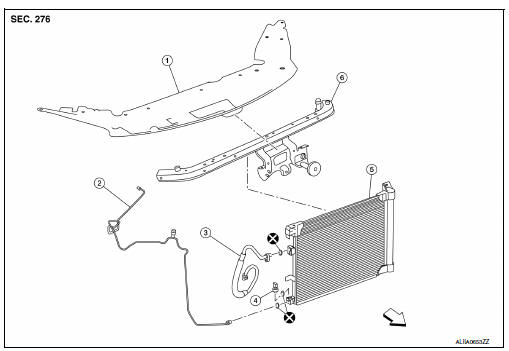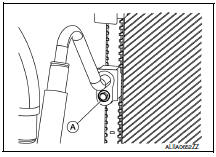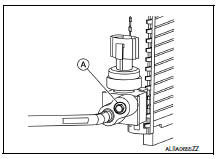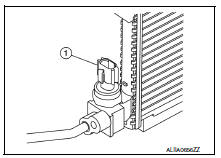Nissan Sentra Service Manual: Condenser
Exploded view

- Core support upper cover
- High-pressure pipe
- High-pressure flexible hose
- Refrigerant pressure sensor
- Condenser and liquid tank assembly
- Core support upper
 Front
Front
Condenser
Condenser : removal and installation
REMOVAL
- Discharge the refrigerant. Refer to HA-23, "Recycle Refrigerant".
- Reposition the hood lock assembly. Refer to DLK-154, "HOOD LOCK CONTROL : Exploded View".
NOTE:
Disconnection of the hood release cable is not necessary.
- Remove the core support upper. Refer to HA-39, "Exploded View".
- Remove the front grille. Refer to EXT-23, "Removal and Installation".
- Disconnect the harness connector from the refrigerant pressure sensor.
- Remove the bolt (A) that retains the high-pressure flexible hose to the condenser, then disconnect the high-pressure flexible hose from the condenser and liquid tank assembly.
CAUTION:
Cap or wrap the joint of the hose with suitable material such as vinyl tape to avoid the entry of air.

- Remove the bolt (A) that retains the high-pressure pipe to the condenser, then disconnect the high-pressure pipe from the condenser and liquid tank assembly.

- Remove the condenser and liquid tank assembly.
INSTALLATION
Installation is in the reverse order of removal.
CAUTION:
- Do not reuse O-rings.
- Apply A/C oil to the O-rings of the condenser for installation.
- After charging refrigerant, check for leaks. Refer to HA-21, "Leak Test".
Refrigerant pressure sensor
Refrigerant pressure sensor : removal and installation
REMOVAL
- Discharge the refrigerant. Refer to HA-23, "Recycle Refrigerant".
- Reposition the hood lock assembly. Refer to DLK-154, "HOOD LOCK CONTROL : Exploded View".
NOTE:
Disconnection of the hood release cable is not necessary.
- Remove the core support upper. Refer to HA-39, "Exploded View".
- Disconnect the harness connector from the refrigerant pressure sensor.
- Remove the refrigerant pressure sensor (1) from the liquid tank on the condenser.
CAUTION:
Do not damage the condenser fins.

INSTALLATION
Installation is in the reverse order of removal.
CAUTION:
- Do not reuse the O-ring.
- Apply A/C compressor oil to the new O-ring for installation.
- After charging refrigerant, check for leaks. Refer to HA-21, "Leak Test".
 Cooler pipe and hose
Cooler pipe and hose
Exploded view
High-pressure service port
High-pressure pipe
Expansion valve
Low-pressure service port
Low-pressure flexible hose
Compressor
Refrigerant pressure sensor
Condenser ...
 Heating and cooling unit assembly
Heating and cooling unit assembly
Exploded view
With air conditioning
Defroster seal
Center ventilator seal
Upper distribution module
Side ventilator seal (LH)
Blower motor
Blower unit
Intake door motor
Power tr ...
Other materials:
Front power window motor
Removal and Installation
REMOVAL
Remove the front door glass regulator (2). Refer to GW-16,
"Removal and Installation".
Remove the bolts (A) and the front power window motor (1).
INSTALLATION
Installation is in the reverse order of removal. ...
Preparation
Special Service Tool
The actual shape of the tools may differ from those illustrated here.
Commercial Service Tool
Clip list
Descriptions for clips
Replace any clips which are damaged during removal or installation.
...
Cruise control operations
The cruise control allows driving at a speed between
25 - 89 MPH (40 - 144 km/h) without
keeping your foot on the accelerator pedal.
To turn on the cruise control, push the
ON·OFF switch. The CRUISE indicator light in
the instrument panel comes on.
To set cruising speed, accelerate the ve ...
